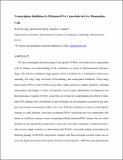| dc.contributor.author | Ang, Wee Han | |
| dc.contributor.author | Myint, MyatNoeZin | |
| dc.contributor.author | Lippard, Stephen J. | |
| dc.date.accessioned | 2011-07-07T14:06:47Z | |
| dc.date.available | 2011-07-07T14:06:47Z | |
| dc.date.issued | 2010-05 | |
| dc.identifier.issn | 0002-7863 | |
| dc.identifier.issn | 1520-5126 | |
| dc.identifier.uri | http://hdl.handle.net/1721.1/64756 | |
| dc.description.abstract | We have investigated the processing of site-specific Pt−DNA cross-links in live mammalian cells to enhance our understanding of the mechanism of action of platinum-based anticancer drugs. The activity of platinum drugs against cancer is mediated by a combination of processes including cell entry, drug activation, DNA-binding, and transcription inhibition. These drugs bind nuclear DNA to form Pt−DNA cross-links, which arrest key cellular functions, including transcription, and trigger a variety of responses, such as repair. Mechanistic investigations into the processing of specific Pt−DNA cross-links are critical for understanding the effects of platinum−DNA damage, but conventional in vitro techniques do not adequately account for the complex and intricate environment within a live cell. With this limitation in mind, we developed a strategy to study platinum cross-links on plasmid DNAs transfected into live mammalian cells based on luciferase reporter vectors containing defined platinum−DNA lesions that are either globally or site-specifically incorporated. Using cells with either competent or deficient nucleotide excision repair systems, we demonstrate that Pt−DNA cross-links impede transcription by blocking passage of the RNA polymerase complex and that nucleotide excision repair can remove the block and restore transcription. Results are presented for 3800-base pair plasmids that are either globally platinated or carry a single 1,2-d(GpG) or 1,3-d(GpTpG) intrastrand cross-link formed by either cis-{Pt(NH3)2}2+ or cis-{Pt(R,R-dach)}2+, where {Pt(NH3)2}2+ is the platinum unit conveyed by cisplatin and carboplatin and R,R-dach is the oxaliplatin ligand, R,R-1,2-diaminocyclohexane. | en_US |
| dc.description.sponsorship | National Cancer Institute (U.S.) (grant CA032134) | en_US |
| dc.description.sponsorship | National University of Singapore (Overseas Postdoctoral Fellowship) | en_US |
| dc.language.iso | en_US | |
| dc.publisher | American Chemical Society | en_US |
| dc.relation.isversionof | http://dx.doi.org/10.1021/ja101495v | en_US |
| dc.rights | Article is made available in accordance with the publisher's policy and may be subject to US copyright law. Please refer to the publisher's site for terms of use. | en_US |
| dc.source | Prof. Lippard via Erja Kajosalo | en_US |
| dc.title | Transcription Inhibition by Platinum DNA Cross-links in Live Mammalian Cells | en_US |
| dc.type | Article | en_US |
| dc.identifier.citation | Ang, Wee Han, MyatNoeZin Myint, and Stephen J. Lippard. “Transcription Inhibition by Platinum−DNA Cross-Links in Live Mammalian Cells.” Journal of the American Chemical Society 132.21 (2010) : 7429-7435. | en_US |
| dc.contributor.department | Massachusetts Institute of Technology. Department of Chemistry | en_US |
| dc.contributor.approver | Lippard, Stephen J. | |
| dc.contributor.mitauthor | Lippard, Stephen J. | |
| dc.contributor.mitauthor | Ang, Wee Han | |
| dc.contributor.mitauthor | Myint, MyatNoeZin | |
| dc.relation.journal | Journal of the American Chemical Society | en_US |
| dc.eprint.version | Author's final manuscript | en_US |
| dc.type.uri | http://purl.org/eprint/type/JournalArticle | en_US |
| eprint.status | http://purl.org/eprint/status/PeerReviewed | en_US |
| dspace.orderedauthors | Ang, Wee Han; Myint, MyatNoeZin; Lippard, Stephen J. | en |
| dc.identifier.orcid | https://orcid.org/0000-0002-2693-4982 | |
| mit.license | PUBLISHER_POLICY | en_US |
| mit.metadata.status | Complete | |
